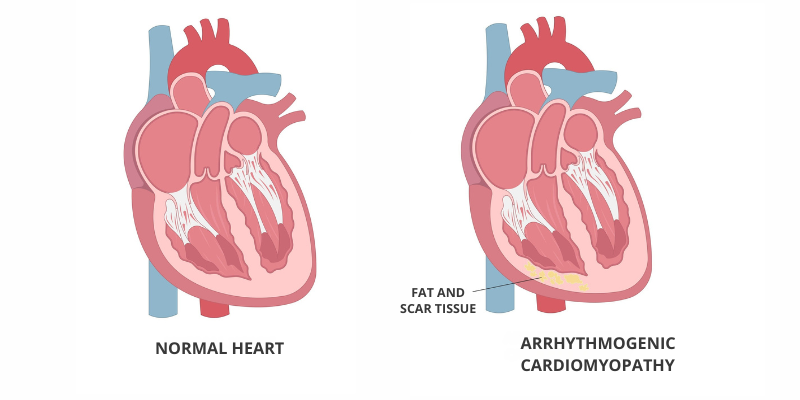
Arrhythmogenic cardiomyopathy
What is arrhythmogenic cardiomyopathy, and how does it affect the heart?

Arrhythmogenic cardiomyopathy (ACM) is a condition that affects the heart muscle, especially the left ventricle.
The muscle tissue is replaced by fatty tissue and this causes scarring on one or both sides of the heart. The scarring may cause abnormal heart rhythm (ventricular tachycardia) and, if not treated, can lead to cardiac arrest.
ACM is a rare hereditary condition. It affects one patient in 5000 and mostly affects men, but can also affect women. About 40 per cent of patients have a genetic mutation that causes ACM.
- palpitations (heartbeats that feel strange)
- syncope (fainting that is caused by a cardiovascular issue)
- cardiac arrest
- heart failure
- shortness of breath
- fatigue
- dizziness
- medical and family history
- echocardiogram
- electrocardiogram (ECG/EKG)
- exercise stress test
- Holter monitor
- cardiac magnetic resonance imaging (MRI)
- genetic testing
ACM cannot be cured, but it can be managed. Treatment plans vary and may include:
- medication
- minimally invasive procedures, for example implanting a cardioverter defibrillator (ICD)
- surgery, for example ablation
- limiting certain physical activities
I am a patient diagnosed with ACM. What do my genetic test results mean?
This result is inconclusive.
Even though your test result is negative, we recommend your immediate family members (parents, siblings, and children) have regular check-ups with experts every three years. These check-ups should include an echocardiogram, electrocardiogram and a Holter.
Remember: the negative genetic test result doesn't change your diagnosis or affect the care plan that you have with your cardiologist.
This result confirms the genetic nature of the condition. In most cases, the risk of transmitting the mutation to your children is 50 per cent or 1 in 2. Your parents and siblings also have a risk of 50 per cent of inheriting this mutation. This result can’t predict how the condition will develop or what specific symptoms you might have.
Sometimes, a change is found in a gene linked to ACM, but there isn’t enough scientific information to know if it’s harmful or not. This is called a variant of uncertain significance, or VUS.
This type of result is inconclusive and we do not recommend testing for this variant in family members. This result is treated like a negative result and clinical evaluations for immediate family members are recommended. If a family member has the same symptoms as you, we may consider testing for the variant and evaluating its impact in the family.
We invite you and your family to stay in touch with the clinic and check in again in 2 to 3 years, as your genetic results may change over time.
I am a family member of a patient with ACM. What should I expect?
You have the same mutation as a family member who is diagnosed with ACM, but you don't have any symptoms. This is common in cardio-genetics. ACM is a complex condition that can be influenced by small genetic changes and environmental factors.
Having the mutation doesn't mean you will develop symptoms of ACM. Your cardiologist will likely ask for yearly check-ups to monitor your heart health so, if any issues develop, they are caught early and can be treated. If you have children, they will have a 50 per cent risk of inheriting the same mutation. Genetic screening will be available to them.
You’re not at an increased risk of developing ACM. There’s no need for specialized screenings for ACM. You didn’t inherit the mutation, so you can’t pass it on to your children.
